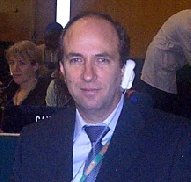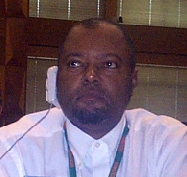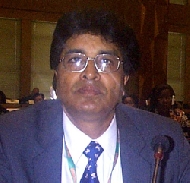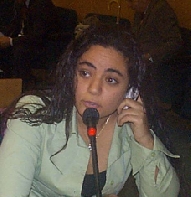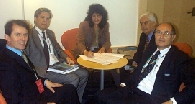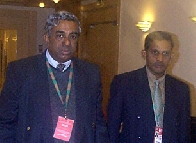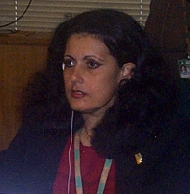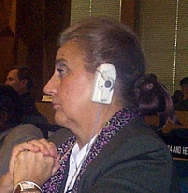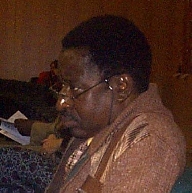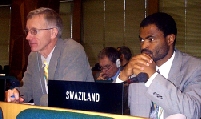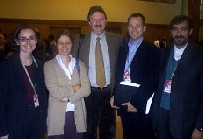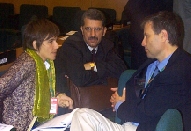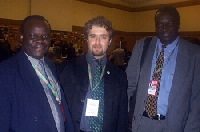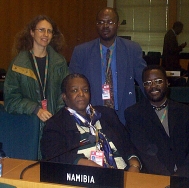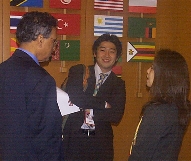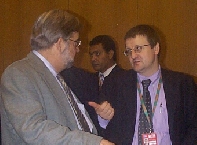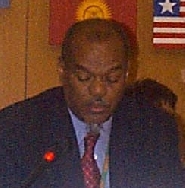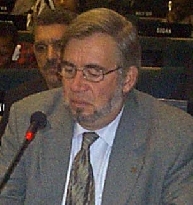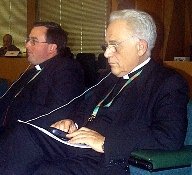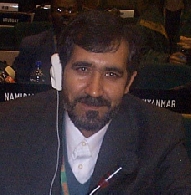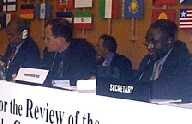Version
française:
Bulletin des
Négociations
de la Terre
|
ENB summary reports |
HTML |
PDF |
TXT |
|
SUMMARY-1 |

|
 |

|
|
SUMMARY-2 |
 |
 |
 |
|
|
 Visit
the Secretariat of Visit
the Secretariat of
the United Nations Convention to Combat Desertification
|
|
 Visit
the First Session of the Committee for the Review of the
Implementation of the Convention (CRIC1) Visit
the First Session of the Committee for the Review of the
Implementation of the Convention (CRIC1)
|
|
 *To
view PDF files, you will need the free Adobe Acrobat Reader *To
view PDF files, you will need the free Adobe Acrobat Reader
|
|
First Session of the Committee for the Review
of
the Implementation of the Convention (CRIC1)
Rome,
Italy |
11 - 22 November 2002
Friday
22
| Delegates met for the final time at
CRIC-1 to adopt the programme of work for the second session of the
committee for the review of the implementation of the convention (CRIC-2)
and the report of CRIC-1, including the conclusions and recommendations (ICCD/CRIC(1)/L.1).
| |
|
|
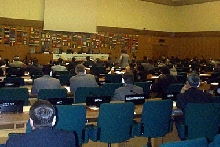 |
Adoption of the programme of work
for CRIC-2:
Opening the final day of the CRIC-1,
CRIC Chair Biaou presented the recommendations on the programme of
work for CRIC- 2, noting that CRIC sessions held during the ordinary
sessions of the COP will: consider the comprehensive report of the
intersessional session; review the policies, operational modalities
and activities of the GM; review reports prepared by the Secretariat
on the execution of its functions; and consider reports on
collaboration with the GEF. Finland on of behalf of the EU, said that
these sessions should: clearly identify the roles of all stakeholders
in the CRIC and ensure that NGOs, CBOs, scientists and development
partners play meaningful roles in the review; be structured on small
time-limited thematic groups focusing on issues across regions;
include the CST Expert Group; place greater emphasis on socioeconomic
issues; be presented with more subregional and regional case studies;
address only three thematic issues per session; report on results and
outcomes using appropriate indicators; and organize the session over a
five-day period only. Brazil proposed that the next session deal with:
the problems of developing country implementation and the
identification of possible solutions in this regard; prioritizing
socioeconomic issues; identifying synergies between the CCD and other
global processes dealing with combating poverty, hunger and famine;
and establishing links between protectionist practices in world
agricultural trade and desertification and suggested that the WTO be
requested to present data on these linkages. |
| |
|
| |
|
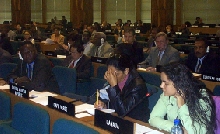 |
Adoption of the report of CRIC-1:
CRIC Rapporteur Franco Micieli de Biase
(Italy) introduced the draft report of CRIC-1(ICCD/CRIC(1)/L.1). He
stressed that the CRIC was established in accordance with Decision
1/CP.5, to regularly review the implementation of the CCD, to draw
conclusions, and to propose concrete recommendations on further
implementation steps to the COP. He outlined that during the two
previous weeks, the CRIC met in 18 sessions, considering, inter alia:
presentations by affected country Parties; comments made by developed
country Parties; a report prepared by the Secretariat on actions aimed
to strengthen the relationships with other relevant conventions and
agreements; a report on financial mechanisms in support of CCD
implementation, including the GEF; and information and advice provided
by the CST and the GM. Elaborating on the CRIC's seven key thematic
issues identified at COP-5, he highlighted the success of the
discussions in the plenary and the Global Interactive Dialogue, and
outlined the structure of the report. |
| |
|
| |
|
|
 |
CRIC Chair Biaou then presented the draft report to the CRIC for
adoption, underscoring that the report is the result of the views,
comments and suggestions as presented by all parties to the CRIC.
After discussion of some minor points, the Parties adopted the
recommendations to be forwarded to COP-6. |
| |
|
| |
|
CLOSING STATEMENTS
|
|
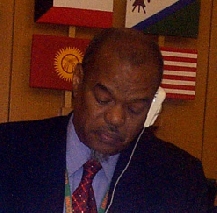 |
Commencing the closing ceremonies of the CRIC, the CCD Executive
Secretary congratulated participants on the successful conclusion of
their work, and stressed the importance of the meeting. He praised the
presentations as they showed both the strengths and weaknesses of the
CCD, but warned that there are still major challenges ahead and that
Parties will have no excuse but to meet the CCD's objectives as set
out in NAPs, SRAPs and RAPs. |
| |
|
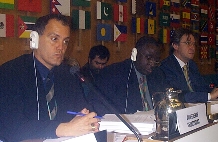 |
In his closing statement, Chair Biaou stressed that immediate actions
are necessary with an eye to long-term results. He said that the
meeting has shown that the CRIC initiative was not an empty idea or a
waste of time, and welcomed recognition that it serves an important
purpose. CRIC Chair Biaou closed the session, to acclamation. |
| |
|
| |
|
Links
|
 Text
of the convention and useful information
Text
of the convention and useful information
 CCD information on
desertification and the Convention
CCD information on
desertification and the Convention
 Official
Documents of the First Session of the CRIC
Official
Documents of the First Session of the CRIC
 Press release on the CRIC
Press release on the CRIC
 CRIC1 - Tentative
Schedule
CRIC1 - Tentative
Schedule
 Adoption of the Agenda and Organization of Work
Adoption of the Agenda and Organization of Work
 Arrangements for the First Session of the Committee for the Review of the
Implementation of the Convention
Arrangements for the First Session of the Committee for the Review of the
Implementation of the Convention
 Linkages
desertification issues page and
COP-5
summary report.
Linkages
desertification issues page and
COP-5
summary report.
| Linkages
home | IISDnet | E-mail
|
©
2002, IISD. All rights reserved.
|








